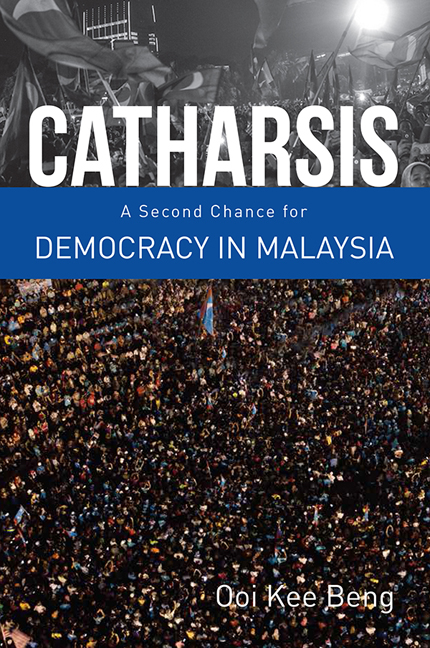Book contents
- Frontmatter
- Contents
- Foreword
- 1 Introduction – Malaysia's Future Is Redeemed
- Before Pakatan Harapan
- Before 9 May 2018
- With Mahathir at the Helm
- 31 One Thing Is Certain—There Will Be More Amendments to the Constitution
- 32 The More Things Change, the More Things May Actually Change
- 33 Did Merdeka Liberate or Create Malaya?
- 34 Interview with Nurul Izzah Anwar: Rebuilding a Nation Long Divided
- 35 The Diminishing of Humans Through Identity Politics
- 36 The Art of Dismantling Cultural Pluralism
- 37 No Need to Let Bigots Dictate Policy
- 38 What the Penang Floods Say About Malaysian Politics (and It's Not Just About Climate Change)
- 39 This is the Moment of Truth for Malaysia's Race-based Politics
- 40 We are Equal Only Through Our Vote
- 41 Why the Opposition Has a Shot at Toppling the Barisan Nasional with Mahathir at the Helm
- 42 Spiralling Back towards Reformasi
- 43 Individual Freedom Is a Matter of National Survival
- 44 Why Meet the Twenty-first Century with Twentieth Century Mindsets?
- 45 A Final Quarrel between a Repentant Grandfather and Oldfashioned Self-absorbed Parents
- 46 Outraged Enough to Go Vote or Cynical Enough to Stay Home?
- Beyond 9 May 2018
- About the Author
31 - One Thing Is Certain—There Will Be More Amendments to the Constitution
from With Mahathir at the Helm
Published online by Cambridge University Press: 12 February 2019
- Frontmatter
- Contents
- Foreword
- 1 Introduction – Malaysia's Future Is Redeemed
- Before Pakatan Harapan
- Before 9 May 2018
- With Mahathir at the Helm
- 31 One Thing Is Certain—There Will Be More Amendments to the Constitution
- 32 The More Things Change, the More Things May Actually Change
- 33 Did Merdeka Liberate or Create Malaya?
- 34 Interview with Nurul Izzah Anwar: Rebuilding a Nation Long Divided
- 35 The Diminishing of Humans Through Identity Politics
- 36 The Art of Dismantling Cultural Pluralism
- 37 No Need to Let Bigots Dictate Policy
- 38 What the Penang Floods Say About Malaysian Politics (and It's Not Just About Climate Change)
- 39 This is the Moment of Truth for Malaysia's Race-based Politics
- 40 We are Equal Only Through Our Vote
- 41 Why the Opposition Has a Shot at Toppling the Barisan Nasional with Mahathir at the Helm
- 42 Spiralling Back towards Reformasi
- 43 Individual Freedom Is a Matter of National Survival
- 44 Why Meet the Twenty-first Century with Twentieth Century Mindsets?
- 45 A Final Quarrel between a Repentant Grandfather and Oldfashioned Self-absorbed Parents
- 46 Outraged Enough to Go Vote or Cynical Enough to Stay Home?
- Beyond 9 May 2018
- About the Author
Summary
As with all agreements, consensus and contracts, a Constitution is a hunt for a balance – and a dynamic one at that, between the expressing on one hand of lofty national aspirations and ambitions, and on the other of compromises meant to be more binding than they usually turn out to be.
It is an act of self-definition and self-control, where rights and duties are laid out in broad generic terms. Thus, one can see it either as a search for common ideals, or as an arena of contestation where the fortunes of different interest groups shift over time. Which parts are carved in stone and which parts are of wet clay? That seems to be the unanswerable question.
Edmund Burke, the famous conservative and vivid scholar of the French Revolution wrote in 1790 in Reflections on the Revolution in France that ‘A state without the means of some change is without the means of its conservation. Without such means it might even risque the loss of that part of the constitution which it wished the most religiously to preserve.’
The obsession that Malaysian political parties have about the twothirds majority in parliament is a clear reflection that the country's Constitution is an arena of contestation rather than an expression of common ideals. Having the means to amend the Constitution is what power seems to be about.
One can certainly argue that the contingencies of the 1950s – the fear of communism, the rush to gain independence on the part of the Malayan leaders and the need of the British to let its empire fall into a pattern that still left it with serious advantages, made the basic law of the country-to-be a balancing act – a superb act in legal formulation – that allowed most citizens to feel that they had not been excessively ignored.
As we know, the choice for Malaya of a federation model instead of a union model – a decision reached in the immediate post-war period rather than after the communists had been largely defeated in the mid-50s, was not so much a matter of political principle and academic wisdom than it was the expression of the British need to retain the status quo of having sultanates.
- Type
- Chapter
- Information
- CatharsisA Second Chance for Democracy in Malaysia, pp. 111 - 113Publisher: ISEAS–Yusof Ishak InstitutePrint publication year: 2018

